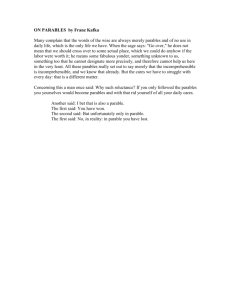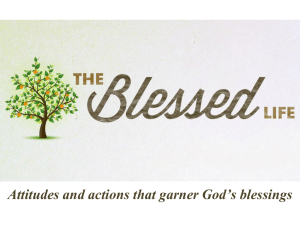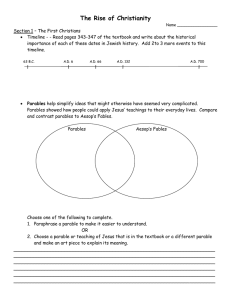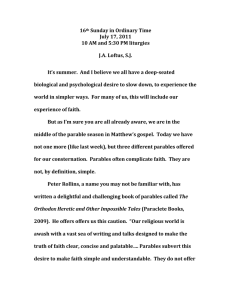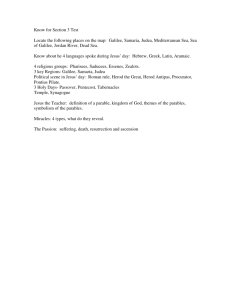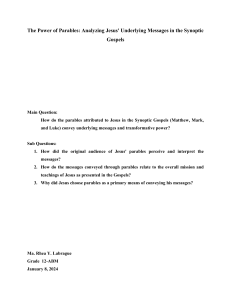PARABLES Jesus’ wisdom teachings
advertisement
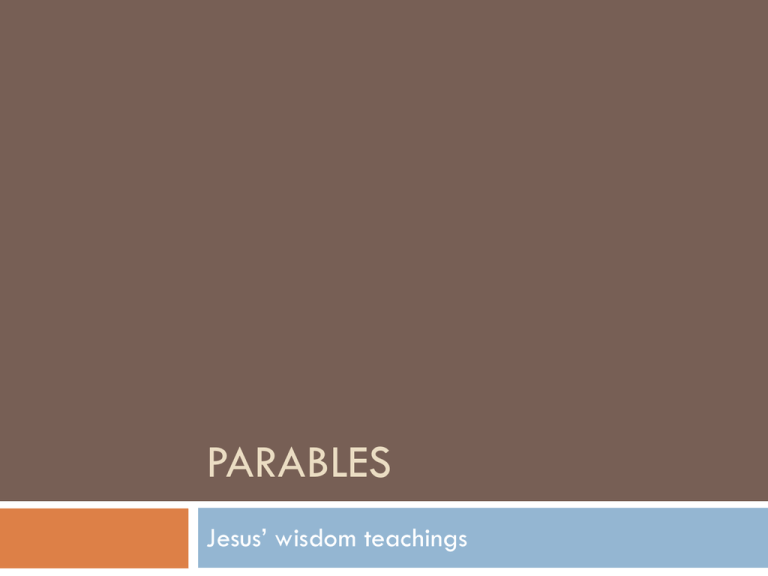
PARABLES Jesus’ wisdom teachings JESUS taught through PARABLES One of Jesus’ favorite teaching methods was through the use of parables. Parables are not unique to Jesus, but Jesus had a real talent for utilizing this method of storytelling to get people to think about themselves and their relationship to each other and God. His ability to do this clearly left a strong impression on the first Christians that they preserved them through the oral tradition and included so many of them in the written Gospels. What is a PARABLE? A PARABLE IS A STORY USED TO TEACH ABOUT TRUTH - - Different from fables, PARABLES have these distinct characteristics: - PARABLES… Involve everyday images address something of human nature teach us something of God’s love tell us something about the Kingdom of God ALWAYS include an “unexpected” twist (Just like a parabola in math—It starts out in one direction and turns!) PARABLES USE “EVERYDAY” IMAGES MATTHEW THE PARABLE OF THE… -Sower - Weeds among the Wheat - Mustard Seed - Lost sheep - Rich Young Man -Workers in the Vineyard -Two Sons -Tenants -Wedding Feast -Ten Virgins -Talents LUKE THE PARABLE OF THE… -Sower -Lamp -Good Samaritan -Rich Fool -Barren Fig Tree -Great Feast -Lost Sheep -Salt -Lost Coin/Ten Gold Coins -Lost Son -Dishonest Steward -Pharisee and Tax Collector PARABLES contain a ‘twist’… The “twist” in parables is mainly discovered by personal reflection in which Jesus challenges us to look at ourselves. With the exception of the first parable (Parable of the Sower), Jesus does not explain the wisdom…but wants us to figure it out for ourselves. It may ask us to broaden our thinking, and also to deepen our thinking. The “twist” is there to challenge the status-quo thinking we may have become too comfortable with. Sometimes it is about us, sometimes it is about who and what we think is important in society and sometimes it is about our concept of God. continued…. PARABLES contain a ‘twist’ (continued) It’s not always obvious – the twist may be in the title(Good Samaritan), right in the story (Dishonest Steward)or what were to happen afterwards if this story’s events really took place (Lost Sheep). Sometimes, the twist ‘happens’ before the story is even told. (e.g.: In the Parable of the Sower, we may presume that if God were all powerful, why wouldn’t God make sure EVERYONE understood his word. After all, that’s how WE would use power if we had it! Jesus describes God as someone who wants our love to be a free will gift back to him, and risks not getting that from everyone out of respect for the free will he gave us that makes us human….
